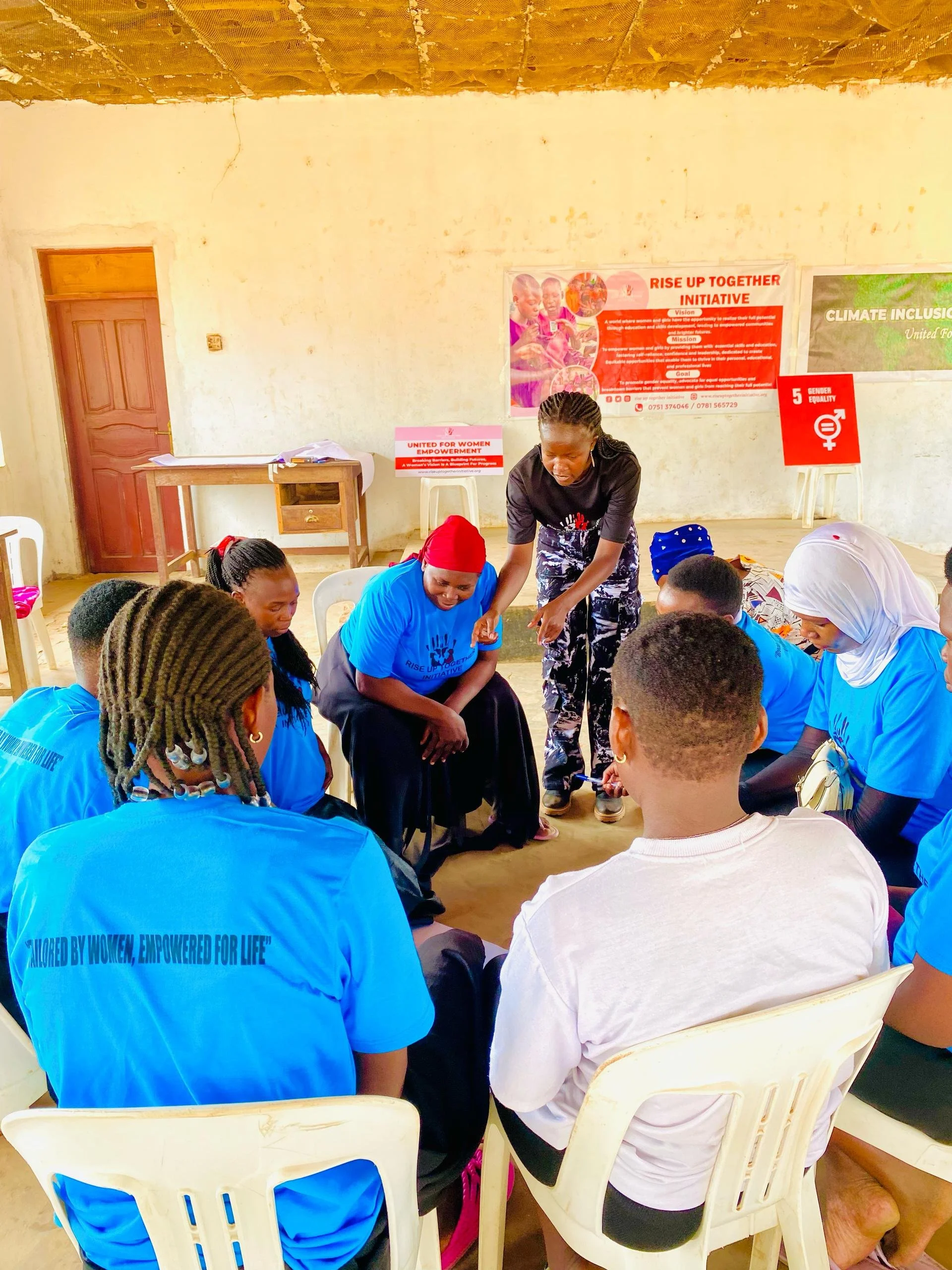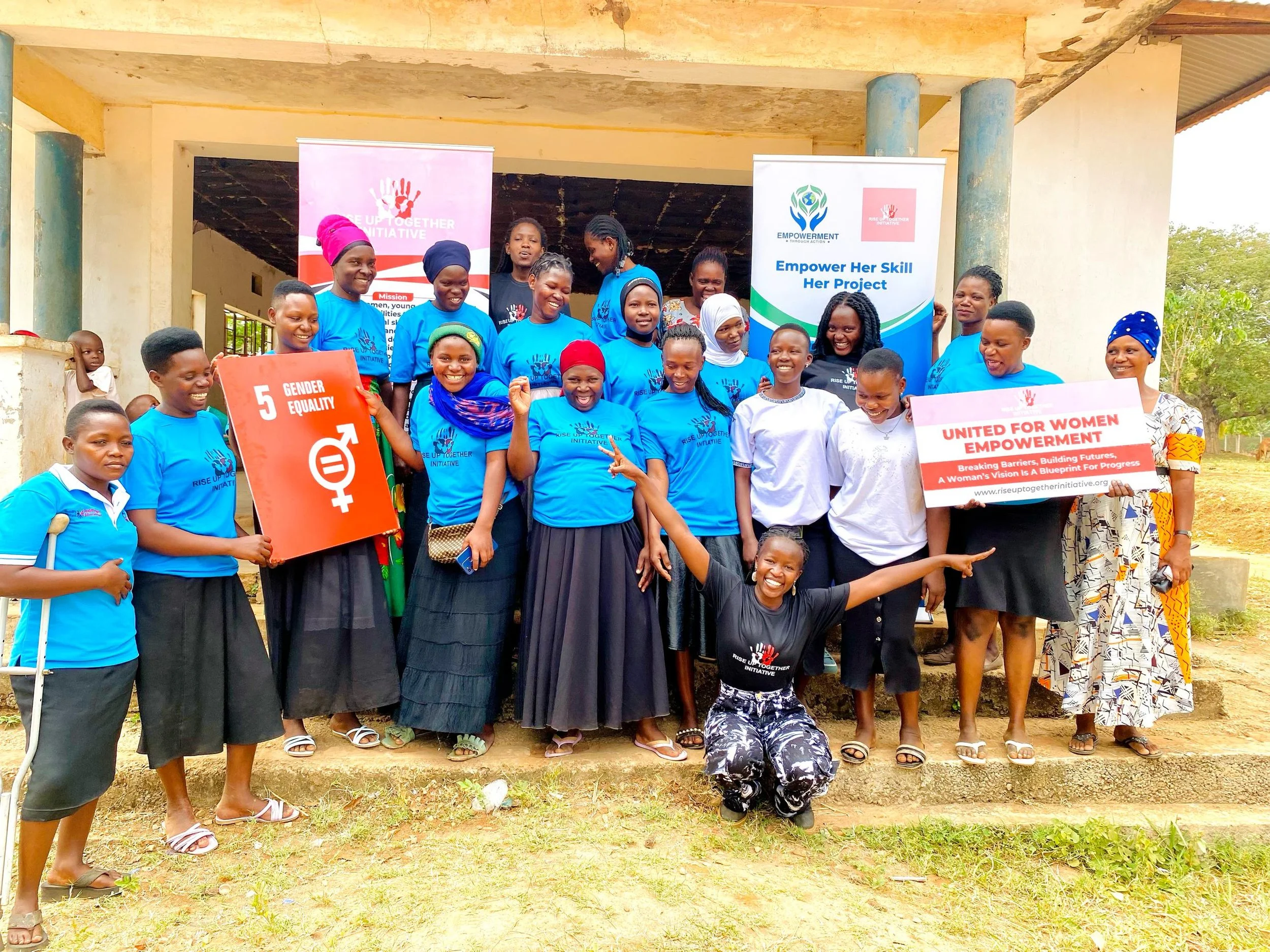In Rural Uganda, Reading Classes Are Giving Women a Voice in Governance
This story was published in collaboration with Egab.
In a small office in Uganda's Sironko District government building, Namisi Phobeth adjusted her reading glasses and scanned the budget document spread across her desk. As Local Council Chair for Nayinyinya village, she was reviewing expenditures for the new water project — a task that would have been impossible just four years ago.
Not long ago, Phobeth couldn't read her own name, let alone chair meetings that shaped her community's future. Official documents worried her. Letters from government offices sat unopened until her husband returned from work to read them aloud.
"I lived in darkness," she recalled. "Every paper that came to me was like a locked door."
Everything changed for her in 2019, when women in her community started gathering under the old mango tree near the village center. Armed with nothing but textbooks and boundless determination, they created an open-air classroom in the open air. Within days of joining class sessions, Phobeth was able to spell her name for the first time. By 2021, she ran for office against three male candidates. Then, she won.
"Now I decide for myself," Phobeth said. "And I inspire other women to do the same."
Women engage in a group discussion during a basic literacy training under the Rise Up Together Initiative in Namutumba District, Uganda, in June 2025. Credit: Melanie Joyce Nabukwasi for More to Her Story
In Iganga District, a two-hour drive away from Sironko, Florence Namukose underwent the same transformation. The 50-year-old mother of six recalled the anxiety that gripped her every time someone handed her a prescription bottle.
"The medicine labels looked like secret codes," Namukose said, laughing now at what once caused her distress. "I used to ask my neighbours to help me understand everything — dosages, timing, even which pills were mine."
Namukose sat at her wooden desk, meticulously updating financial records for her village's savings group. Each entry tracks the economic dreams of villagers who have entrusted her with their money.
"The community trusts me with their savings, and I trust myself," she said, pointing to neat columns of figures. "These books tell the story of our progress."
Like Phobeth, Namukose credited her transformation to a village literacy circle that became much more than reading lessons. "The sessions didn't just teach us letters and numbers," she explained. "They gave us courage to believe we belonged in spaces where decisions are made."
That courage is spreading across eastern Uganda, where grassroots literacy initiatives are reshaping rural governance and community leadership. These women-led programs are creating a new generation of literate, confident leaders.
Kalaa Mugosi Women Empowerment Ltd, founded in 2015 by Sandra Nakayenze, operates from Sironko District where Phobeth now leads. The organization has reached over 2,046 farmers — 60 percent of them women — through programs that blend basic literacy with agricultural training and leadership skills.
"We wanted to meet women where they are," Nakayenze explained, her office walls covered with photos of women at graduation ceremonies. "Instead of waiting for them to come to a classroom, we go to their gardens, their churches, the places where they already gather."
Under sprawling trees or in borrowed church halls, facilitators use stories and demonstrations to teach reading, writing, and arithmetic.
"Recently, more men have started showing up to our sessions too," Nakayenze added with a smile. "They see what's happening to their wives, their daughters, and they want to be part of it."
In Namutumba District, Mukyala Mary launched the Rise Up Together Initiative in 2020. Her program combines literacy with practical skills training — tailoring, making reusable sanitary pads, and financial management.
"We start with what matters most to them — writing their own names," Mary explained. "Once women master that simple act, the confidence to do more follows naturally."
The initiative has worked with over 80 women in four years. "We invest a lot in a few women to equip them with skills to lead their communities' literacy forward. These women spread their knowledge to other women," Mary said.
Uganda's national literacy rate stands at 74 percent, but the gender gap remains persistent: only 71.6 percent of women are literate compared to 76.6 percent of men. In rural districts like Sironko, the disparity is starker — 59 percent of women versus 70 percent of men can read and write.
These grassroots initiatives are chipping away at those statistics, one village at a time.
Participants of the Rise Up Together Initiative pose for a group photo after a basic literacy session in Namutumba District, Uganda, in June 2025. Credit: Melanie Joyce Nabukwasi for More to Her Story
But progress hasn't come without obstacles. Both organizations struggle with chronic underfunding, unreliable transportation to remote villages, and difficulty retaining volunteer facilitators who often leave for better-paying opportunities.
"In rural Uganda, adult literacy is still seen as non-essential," Nakayenze acknowledged. "Many men resist their wives attending sessions, arguing it disrupts household work. We've lost participants to family pressure."
Hon. Florence Nambozo Mayoga, the Woman Member of Parliament for Sironko District who also serves as Minister of State for Karamoja Affairs, credited grassroots organizations for filling gaps that formal education systems have left open.
"When women learn to read, they don't just decode words," Mayoga explained from her Kampala office. "They decode their rights. They understand contracts, health information, legal documents. They participate in governance because they're no longer dependent on others to interpret the world for them."
Mayoga admitted government support has been slow but insists progress is underway. "We've begun conversations about integrating community-led literacy circles into sub-county budgets," she said. "But for now, we rely heavily on NGOs and women's collectives to lead the transformation."
Beyond formal organizations, independent activists are also pushing boundaries. Rosette Gladys Nandutu, a journalist and human rights defender who leads VIDEA, organizes community-based literacy outreach for rural women and widows.
"Many of these women missed school because of early marriage, displacement, or family obligations," Nandutu explained. "Now they're grandmothers and still eager to learn. That determination is powerful."
Nandutu's model relies on peer mentorship, pairing younger women with older learners. "It's not just about reading," she emphasized. "It's about restoring dignity that was taken away when they were denied education as girls."
The ripple effects extend far beyond reading road signs or medicine labels. "Once a woman can read a land title, she asks: 'Why isn't my name on this document?' Once she can follow a council meeting, she asks: 'Why aren't women's concerns being addressed?' That's where real transformation starts," Nandutu said.
As Uganda approaches the 2026 general elections in January, Phobeth has set her sights higher. She's considering a run for district-level office — a goal that would have been unimaginable when she first struggled to write her name under the mango tree.
"My literacy journey opened doors I didn't even know existed," she said. "Now I want to open those same doors for other women."
Nakayenze remains undeterred by the challenges ahead. Despite funding constraints and cultural resistance, she's planning to expand Kalaa Mugosi's reach to additional districts.
"We may not have much money, but we have something more powerful—vision," she said. "Our women are no longer waiting for permission to learn, to lead, to change their communities.
They're reading, they're writing their own stories, and they're not stopping."



